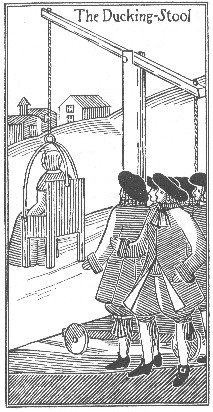PHILADELPHIA, Nov. 1.
We learn that the Judge of the Court of Quarter Sessions for this county, on Friday sentenced a woman to be ducked by immersion as a common scold on Wednesday next.
Annexed is the sentence of the Court —
Commonwealth vs. Nancy James. —
Indictment for a nuisance — charged with being a common scold.
Oct. 11th, 1824 — Verdict, Guilty.
Oct. 29th, 1824 — The prisoner sentenced to be place in a certain engine of correction called a Cucking or Ducking Stool, on Wednesday next, the third day of November ensuing, between the hours of 10 and 12 o’clock in the morning — and being so placed therein, to be plunged into water — that she pay the costs of prosecution, and stand committed until this sentence is complied with. Nat. Gaz.
Republican Compiler (Gettysburg, Pennsylvania) Nov 10, 1824
From duckingstool.com:
Ducking stool, a stool or chair in which common scolds were formerly tied, and plunged into water, as a punishment. The practice of ducking began in the latter part of the 15th century, and prevailed until the early part of the 18th, and occasionally as late as the 19th century. –Blackstone. Chambers.
The picture is also from this website.
LAWS
The court of quarter sessions for Philadelphia county, lately sentenced Nancy James, convicted of being a common scold to be placed in a certain engine of correction called a Cucking or Ducking stool, on Wednesday the 3d of November ensuing, between the hours of 10 and 12 o’clock in the morning, and being so placed therein, to be plunged into the water” &c — The case has been carried up to the Supreme Court to try the legal validity of the sentence, we presume.
Ohio Repository, The (Canton, Ohio) Nov 26, 1824
PHILADELPHIA, Jan. 5.
On Monday last, the judgement of the court of quarter sessions in this city, in the case of Nancy James, who was indicted and sentenced to be ducked as a common scold, was reversed by the Supreme Court, on the ground that no law of Pennsylvania, either statute or common, warranted the sentence of the court below.
Judge DUNCAN considered that this inhuman and barbarous part of the English common law had become obsolete; that, at all events, it had never been brought to this country by our ancestors; that it was incompatible with their humane habits, as well as with the enlightened maxims of civil policy introduced into Pennsylvania by WILLIAM PENN; and that even if the punishment formerly inflicted upon common scolds had ever obtained here, it had, by implication, been repealed by the general spirit of our mild penal code. The decision of the Supreme Court must give universal satisfaction.
Republican Compiler (Gettysburg, Pennsylvania) Jan 12, 1825
A famous scold:
The United States vs. Ann Royal.
Another case came up yesterday before the Circuit Court, which, by the unusual crowd that thronged the Hall, appeared to excite much interest. Mrs. Ann Royal, against whom a bench warrant was issued last week appeared to answer an indictment found against her during the term, by the Grand Jury, for certain alleged improprieties of conduct, denominated in legal phrase ‘common scold’ ‘common slanderer,’ ‘brawler’ ‘common nuisance,’ &c. The defendant’s counsel entered a demurrer to two out of the three counts of indictment, which the counsel for the prosecution agreed to submit to the court without argument. The defendant also asked a continuance of the trial to Friday next, on the ground of the absence of two witnesses material to her defense. The indulgence was granted, on the understanding that if she was convicted, the expense, (growing out of the repeated attendance of many witnesses) would be paid by her. The trial was accordingly postponed to Friday, — Gaz.
On the 18th Mrs. Royal was heard first by her counsel, 2dly by her witnesses, and lastly by her eloquent self. Nevertheless the jury ungallantly found her guilty, and the Bench still more ungallantly ordered her to jail, until she found bail for her appearance to receive judgment, which was arrested by her counsel. “This is a pretty country we live in,” said she, as she heard the mandate for her incarceration.
Ohio Repository, The (Canton, Ohio) Jul 31, 1829
For more on scolds and ducking, see my “To Punish Scolds” post. There will also be two more posts on this topic, later this week.






